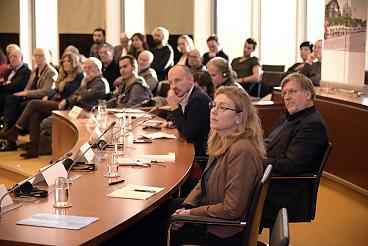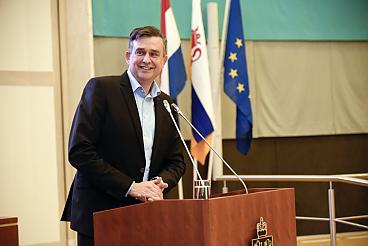Report of the SP’s international conference on 25 years of Maastricht: 'Only a radical change of direction can put the EU on the right path’
Report of the SP’s international conference on 25 years of Maastricht: 'Only a radical change of direction can put the EU on the right path’

Emile Roemer (Socialist Party of the Netherlands, the hosts)
SP-leader Emile Roemer warned that change was now harder than ever. “A budget deficit below 3% of GDP and a national debt below 60%. These for Brussels sacred figures are leading to a stupid sell-off of huge sections of the public domain and mean that we stagger from crisis to crisis,” he said, “Only a radical change of direction can put us on the right path. That's why the Union must, as rapidly as possible, change both direction and tempo and begin a discussion around a better form of European cooperation, culminating in a new treaty. A cooperation in which Brussels no longer plays the boss and the member states regain control of their own budget and their own policies, policies in which people are to the fore, not cash, bankers and multinationals.”
Roemer made a number of proposals. “Abolish the European Commission. Restore national sovereignty. Invest in society, in employment and wages, and put an end to the obligation to join the eurozone as soon as a member state meets the criteria. The euro has not turned out to be a binding agent, but rather a divisive force and a sledgehammer with which to demolish social and democratic rights.”
Roemer’s conclusion was that “A new European treaty must top the agenda. So that we can have a progressive discussion as to how we can work once again for peace, security and progress for all.”

The conference then heard the foreign guests’ speeches.
Andrej Hunko (Die Linke, Germany)
It’s Important to have a debate on the structures of the European Union, Hunko began. They have failed in the face of the crisis, an economic crisis which has especially affected southern Europe, the political crisis occasioned by Brexit. The criteria laid down in the Maastricht Treaty don’t fit the current situation. There are no criteria for levels of unemployment, for instance. Greece has debts which it simply can’t pay, but the Maastricht Treaty criteria prevent us doing anything about this. The EU is run in the interests of the stronger economies. Joseph Stiglitz called his recently published book The Euro: How a Common Currency Threatens the Future of Europe. The euro is a product of the Maastricht Treaty and yet the treaty’s architecture is destroying the euro system. The problem for us is that we are socialists and thus internationalists. We are in favour of international cooperation, but this desire for peace between nations and cooperation to mutual advantage has been exploited to impose the euro with its restrictive structures. Our nations fought each other seventy years ago. We don’t want to go back to that. Instead we want a refoundation.
The euro crisis in 2009 showed that the provisions of the Maastricht Treaty were unsuitable for the development of an ecologically-minded, peaceful Europe. But the problem is knowing how we can possibly change the treaties. We now have the European Semester and other ‘reforms’ aimed at lowering wages and reducing public services. When the banks failed, instead of reorganising the banks, the EU forced economies to cut their social standards. The question now is how we can we change the treaties. How can we have a different solution to that of Wolfgang Schäuble and his ilk?
The EU isn’t working and is orientated only towards the budget, concluded Hunko. It exists only to serve the interests of neoliberalism and stronger economies. The architecture of the Maastricht Treaty actually weakened the idea of making progress together. We need, he said, a new EU Treaty to replace the present treaties which stand in the way of a social Europe. That’s why revision is needed, a complete revision, a plan B.
Marc Botenga (PvdA, Belgium)
Botenga opened his contribution by asking “how on earth should we celebrate the 25th anniversary of the Maastricht Treaty?” This European Union is a project by and for every kind of powerful multinational, he continued. And that explains why the Union today appears absurd. Why can’t Greece renounce austerity, when the Benelux countries can help corporations to dodge their taxes? Why can’t Wallonia block a trade treaty, yet the Commission can bring a court action against a German and French minimum wage? Why, while Germany is running an enormous trade surplus, is the Italian economy staggering around?
How could you bring such very different economies under the same umbrella? In northern Europe wages were four times higher than in the south. To this question the establishment had an answer: “the Maastricht norms.” Convergence they called it. Grow towards each other. Bring state debt down, and limit budgetary deficits. But convergence didn’t happen. The gap grew bigger. Between countries, but also within countries.
After Maastricht things went from bad to worse. We had the Stability and Growth Pact, that made public investment virtually impossible. And then we had so-called Economic Governance, designed to determine the whole of economic policy in an authoritarian fashion.
We can see the results today. Things aren’t working out economically. Things aren’t working out socially. Not for you, not for me. While millionaires stash their money in Panama, fifty-four million Europeans are affected by energy poverty. That’s three times the population of the Netherlands, having to choose literally between heating and eating.
The European Union is becoming ever more authoritarian. Greece is being bombed flat. Referenda are ignored. The Dutch government too has some strange ideas about what to do about the result of your Ukraine referendum. In the European Parliament new procedural rules will silence alternative voices. In European election after European election, fewer people are voting. In Slovakia last time the turnout was a mere 13%.
Between society and the establishment there looms an enormous gap. This has even been noticed recently by the Financial Times. When Wallonia refused to sign the Comprehensive Economic and Trade Agreement – the CETA – with Canada, the business people’s newspaper commented that the eurocrats never thought they’d have to reckon with a former steelworker who now represents the PTB-PVDA in the Walloon Parliament.
People have had enough of this self-serving behaviour of the elite. Against that establishment we are seeing the rise of two currents. One of them bases its decisions on fear. They want us to direct our anger downwards, to spit on the unemployed, refugees, people who have things even tougher. It’s a trick. By spitting on those below, they are protecting the elite above. In doing so they avoid the question of power. Even a billionaire like Trump can then present himself as anti-establishment.
But there is also another current. Ours. The undercurrent. It is led not by fear but by hope. If it's hope you want, you have to look upwards, to that place where the big money is. That place where they write their own tax laws. That place where there’s enough money to buy politicians. Hope comes from below. Yes, there’s Donald Trump. But there’s also Bernie Sanders. There’s the scary UKIP and Nigel Farage, but also Jeremy Corbyn. In Belgium there’s the very right-wing N-VA, but there’s also my own party, the PTB-PVDA. And here I should probably say: there’s Geert Wilders, but fortunately there’s also the SP.
Because if Europe is to survive, this Union must be flipped upside down. We can’t simply clothe this construction of competition differently. We can’t just give all of this inequality a quick makeover, a fresh lick of paint. Otherwise, the nationalist tensions which belong in the twentieth century will also show their ugly mug in this century.
We must begin with a clean sheet, a blank page. It cannot be that the richest countries in the world are unable to guarantee their citizens basic rights. That’s simply not normal. It’s not normal that the right to work, to housing, to education, to health care, that these rights aren’t respected. That’s what European cooperation should be for. Their duty to apply basic rights. Starting over with Europe means that sustainability, democracy and fundamental rights become our only ‘scoreboard’.
We need to get rid of those politicians who are in and out of the revolving doors of corporate boardrooms. We need people driven by social and ecological enthusiasm.
What's next? A new Europe in which work and wealth are redistributed. A Europe that activates wealth: a wealth tax for millionaires, a tax on financial transactions, and an end to tax havens. Putting an end to austerity, pseudo-recovery plans, social dumping and tax dumping. A Europe with higher wages, a minimum wage and equal pay for equal work for all. A Europe where we retire earlier. A human scale continent. For us all to once more live, relax, enjoy ourselves and develop.
Let’s invest in the climate and clean energy, in housing and public transport, in health care and education, culture and art.
If we are to build Europe anew, we need a new principle of European law: the principle of non-regression. Such a principle would mean that you could no longer introduce measures which in social, ecological or democratic terms represent a step backwards. Instead of bitter competition between peoples, we would have solidarity, a voice in our own affairs, rights and sustainability. A Europe like that would be worth working for.
This isn’t a utopian wishlist. On the contrary. It’s more utopian to believe that everything will stay as it is. Nobody still believes that. You can feel the change. And together we can change direction, change attitudes.
Catarina Martins (Bloco de Esquerda, Portugal)
After years in which the European Union appeared as a promise of peace, social cohesion, development, today it appears to the peoples of Europe as a betrayal. The role of the European Union has been to destroy Europe. The withdrawal of sovereignty from the member states, in integration processes that are no more than the subordination of states to economic power, exemplifies the Treaty of Maastricht, which laid the foundations of the single currency.
But we made stupid choices. The EU paid fishermen not to fish, farmers not to farm. Yes, we got roads, schools, hospitals from EU funds, better education, better health care, and none of this would have been possible without the cooperation of the European Union. But we exchanged our sovereignty for these things.
Downward pressure on wages in Portugal and other countries of the south is not only bad for the south, it’s bad for the whole of the European Union, as wages are dragged down everywhere. We were targeted in the international financial crisis and forced to cut pensions and minimum wages which were already extremely low. One in three Portuguese children now lives in poverty. For the first time in many years fewer people are going to university, because it’s too expensive. Some go to Germany where it’s free. But we call this the neither/nor generation, because 300,000 young men and women are now neither in employment nor education.
But we now have a left government, made up of the centre-left Socialists, the Left Bloc – my party - and the Portuguese Communist Party. We have been able to effect some improvements. We have, for example, restored some holidays and raised the minimum wage and the rate of pension payments. But we still have huge unemployment - officially 10%, but the reality is 20%. Much of what we want to do is thwarted by EU rules. We have one public bank and the EU wants it to be privatised. There are no real rules in this Europe. If we had a right wing government we’d have no problem; such a government would be given much more leeway.
Portuguese people work long hours and for more years than any other Europeans but it’s not enough. If the rate on public debt rises, we will be unable to pay. We have no sovereignty, we can’t do anything about the currency. Democracy is being sold to a financial system which is ruining our lives. There are no checks and balances.
We might succeed in changing the EU just a little bit, but real change isn’t going to happen. That’s why the left has a responsibility to build an alternative to this European Union, which is now the real threat to the people of Europe. We’re told if you don’t defend this EU you are encouraging the far right. But people are outraged because the financial system rules their lives. They’re concerned for their jobs and their pensions. We stand for internationalism, for human rights and for cooperation, but we must say that Europe is larger than the EU and that cooperation can be done in a very different way. Twenty-five years after Maastricht, we need to build a Europe of cooperation.
There is growing hatred, walls being built, xenophobia. The breakdown of the European Union is not a distant danger. We have already seen Brexit, and the growth of the extreme right. Disaggregation and divergence is what we are living through and the left has to respond with an alternative.
The response to the crisis in which the European Union finds itself requires the recovery of mechanisms of democratic and popular sovereignty in each state, so that another Europe can be built, a Europe of solidarity and cooperation.
European cosmopolitanism and international solidarity are incompatible with the subordination of one state to another, or democracy to finance, and can only defend themselves in struggles for social, economic and environmental justice.
The panel discussion
 Led by SP Senator Tiny Kox, the panel discussion made it clear that calls for change in Europe are becoming both louder and more widespread. Joan Muysken, professor emeritus in economics at the University of Maastricht, hit the nail on the head when he argued that the introduction of a common currency without any political foundation has led to major problems. The contradictions between northern and southern Europe are growing in intensity, and it’s countries such as Greece and Portugal which are picking up the tab. The Netherlands exports 8% more than it imports. But instead of that money being invested it was hoarded by multinationals and shareholders. The political effects of this are clear: political cynicism and the demonization of opponents. And the solution? Secure jobs and broad access to education and culture.
Led by SP Senator Tiny Kox, the panel discussion made it clear that calls for change in Europe are becoming both louder and more widespread. Joan Muysken, professor emeritus in economics at the University of Maastricht, hit the nail on the head when he argued that the introduction of a common currency without any political foundation has led to major problems. The contradictions between northern and southern Europe are growing in intensity, and it’s countries such as Greece and Portugal which are picking up the tab. The Netherlands exports 8% more than it imports. But instead of that money being invested it was hoarded by multinationals and shareholders. The political effects of this are clear: political cynicism and the demonization of opponents. And the solution? Secure jobs and broad access to education and culture.
Arjo Klamer, economist and SP councillor in the executive of the Hilversum local authority, where the SP forms part of the governing coalition, told how when he was working in the United States twenty-five years ago, the introduction of the euro was looked at with astonishment, seen as the story of a European ghost train. The social function of money is to ‘connect’, but because there’s no basis of support for capital transfers from northern to southern Europe and because the European Union chooses to permit wage dumping, the euro threatens to become untenable. Klamer’s expectation is that the Germans, as the parent of the while scheme, will in the short term pull the plug on the euro project. The corollary will of course be a plea for multiple currencies.
Finally, Miriam van Reisen, a lecturer in International Relations at the University of Tilburg, presented a critical South-North view of the dilemmas surrounding European cooperation. Her talk focused on the IMF- and World Bank-imposed Structural Adjustment Programmes which in recent decades have led to the demolition of society and economy in countless developing countries. Europe was now paying a price as masses of people, through lack of any future prospects, were now knocking on the door of Fortress Europe.
- See also:
- Europe
